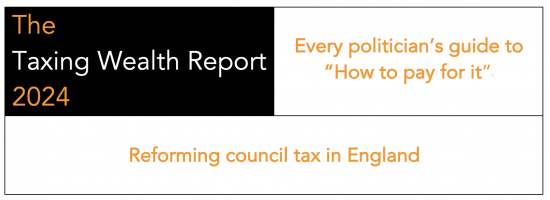[ad_1]
I have this morning published the latest note in my series that will make up the Taxing Wealth Report 2024. This latest note deals with a number of proposals for the reform of council tax in England. Broadly similar proposals could also be applied in Wales and Scotland which have slightly differing but not dissimilar council taxes, but not in Northern Ireland, which does not have this tax.

The summary of this note says:
Brief Summary
This note recognises that the council tax system used in England (of which variations are in use in Wales and Scotland, but not Northern Ireland) was always a hasty compromise when it was introduced in 1993, and that nothing has improved it since then.
For one pragmatic reason, however, it is not suggested that major reform of this tax take place as part of the whole package of reforms suggested in the Taxing Wealth Report 2024. That pragmatic reason is that there are many better ways of transforming the tax system as a whole to tackle the inequalities created by wealth in the UK than by expending a great deal of effort to totally redesign or even replace council tax. If the goal is to tackle the issue of wealth inequality in a systemic fashion then complete council tax reform has to come a long way down the list of potential reforms, even though the tax as it currently stands is very far from ideal.
That said, there is much that can be done within the parameters of the existing tax and this note proposes that if the goal is to more appropriately tax high and low-value properties, and in the process reduce the regressive nature of this tax, then this will require:
- Property revaluations.
- Increasing the number of bands used for property
- Changing the ratio of tax charged between top and bottom bands of council tax.
- Changing the exemptions available to those on benefits.
- Changing the treatment of second properties.
- Changing the treatment of vacant properties.
- Using central government grant-giving mechanisms to provide more support for local authorities in poorer areas whose revenues will fall as a result of these proposals.
The result could be a considerably fairer tax than we have at present, but not an optimal solution, which would have to wait for attention when more of the issues tackled in the Taxing Wealth Report 2024 have been addressed.
It is important to note that it is very unlikely that this proposal would raise additional tax revenues. There is very little scope to do that within the existing structure of this tax, not least because the number of high-value properties that are undertaxed at present is quite small, and any proceeds from taxing them more appropriately should be used to reduce charges elsewhere across the tax bands. The aim should be to create a fairer tax.
Discussion
Council tax is often noted as one of the more regressive taxes within the overall UK taxation system, whichever of the varieties is being referred to. The fact that very high-value properties are very obviously under-taxed by existing council tax arrangements is a point of irritation for many who would prefer a more progressive taxation system. However, that being said, only a tiny number of properties actually fall into the under-taxed category, and the potential for raising any significant additional revenue from this tax is decidedly limited. That is most especially the case if the excessive burden that this tax frequently imposes on those who are on low incomes, or who live in small properties, or who are on any form of benefit, is to be alleviated.
As such, the focus of the recommendations made here is to produce a fairer version of council tax in ways that would not impose significant political or financial cost, whilst creating significantly greater equity, with the necessary attention required to address inequality being focused elsewhere on other issues addressed by the Taxing Wealth Report 2024.
Cumulative value of recommendations made
The recommendations now made as part of the Taxing Wealth Report 2024 would, taking this latest proposal into account, raise total additional tax revenues of approximately £111.4 billion per annum.
[ad_2]
Source link


